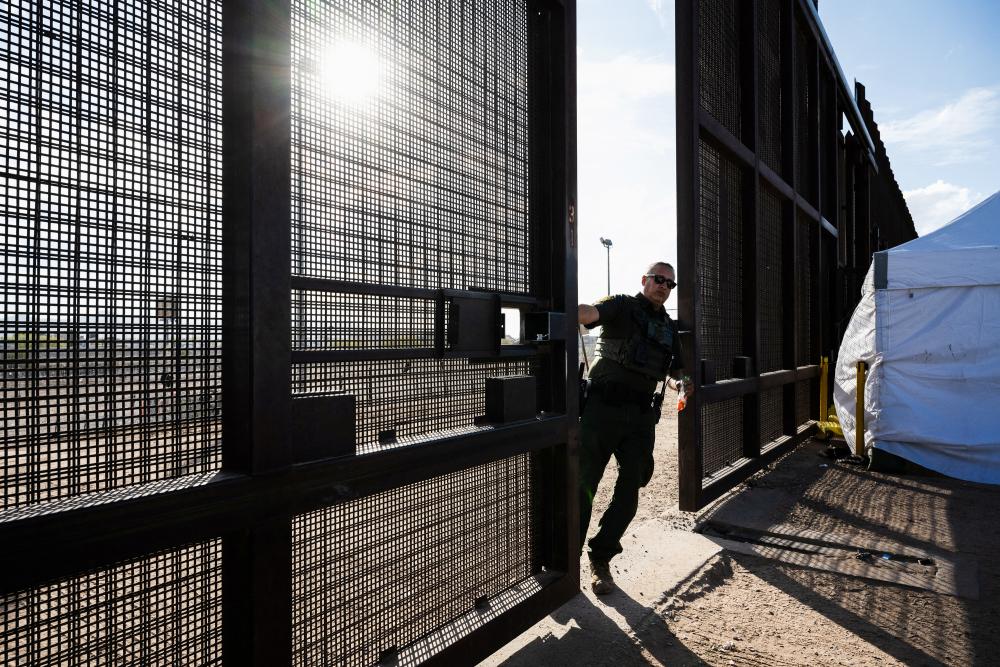There was puzzlement, after the law had been in force for a few hours and was then blocked by an appeals court around midnight, about whether and when state troopers or Texas national guard soldiers – who have the most interaction with migrants – would begin enforcement.
Related: The unprecedented situation at the US-Mexico border – visualized
A hearing was to take place on Wednesday before a panel of the fifth circuit court of appeals, which issued the most recent ruling in the twisting case of the law known as SB4 late on Tuesday.
The Kinney county sheriff, Brad Coe, who has largely embraced the multibillion-dollar border enforcement effort of Texas’s hard-right governor, Greg Abbott, said he was “prepared to proceed with prosecutions” but officers would need “probable cause” to make arrests. His county covers a stretch of border near Del Rio that was recently the busiest corridor for illegal crossings but has quieted considerably.
“It is unlikely that observers will see an overnight change,” Coe said.
The El Paso county judge, Ricardo Samaniego, the top county executive, said immigration enforcement should remain a federal, not state, responsibility, echoing the Biden administration’s view.
He said heightened law enforcement presence in the city of El Paso during a previous migrant surge brought high-speed chases and traffic stops based on assumptions that passengers were in the country illegally.
“We had accidents, we had injuries, we got a little glimpse of what would happen if the state begins to control what happens in respect to immigration,” Samaniego said.
The impact of the battle between state and federal powers over immigration law extends far beyond the Texas border. Republican legislators wrote the law so that it applies in all of the state’s 254 counties, although Steve McCraw, the director of the Texas department of public safety, has said he expects it will mostly be enforced near the border.
The University of Texas law professor Steve Vladeck predicted that the appeals court is likely to leave SB4 on hold until the US supreme court weighs in again, posting on X/Twitter that it would remain blocked “indefinitely”.
Among other things, this sends a *very strong* signal that the panel is likely to *deny* Texas’s application for a stay pending appeal. So #SB4 will remain blocked *indefinitely,* unless *Texas* persuades #SCOTUS to put it back into effect.
— Steve Vladeck (@steve_vladeck) March 20, 2024
After the latest in a series of contradictory court rulings, Lina Hidalgo, the judge of Harris county, centered on Houston, told CNN that “absolutely” there was confusion in the state and that “even legal experts are calling it whiplash”. She is opposed to the law.
Abbott has claimed there is an “invasion” of Texas by unauthorized migrants, allowing him to take immigration power into the state’s hands as if it was on some sort of war footing.
“It makes me nervous because the law is focused on whether you are suspected of being an immigrant, it’s so extreme, it allows law enforcement to say, ‘you look brown, you look Hispanic’ and you can be arrested and then possibly deported,” she told the cable news channel on Wednesday morning.
Hidalgo said many members of law enforcement she dealt with were not prepared to enforce the law. She told CNN she could imagine a scenario where she herself went for a jog and was stopped by local police saying: “you look like you may be here on an undocumented basis” and said: “This is a terrible precedent.”
An appeals judge just before midnight on Tuesday said that no matter how strongly Texas disagreed with the federal government’s application of immigration law at the US-Mexico border, it did not justify the state’s defiance of the US constitution.
The new Texas law attempts to take the power from the federal government to say that crossing into Texas from a foreign country is a crime unless you are crossing via a legal port of entry, including if you cross the Rio Grande, the river that divides Texas from Mexico, with hopes of claiming asylum but without an appointment with the US authorities. Anyone apprehended could be arrested by local or state police and charged with a misdemeanor in state court or with a felony for a repeat alleged violation.
Migrants could be ordered to return to Mexico – even though the Mexican government quickly said it would not accept non-Mexicans thus expelled.
On Wednesday, the Mexican president, Andrés Manuel López Obrador, sharply criticized the Texas law saying it violates international law and is “draconian, dehumanizing and unfair”, and would prompt a diplomatic response from Mexico.
Other Republican-led states far from the border are also already looking to follow Texas’s path. In Iowa, more than a thousand miles from the Mexico border, the state lower house on Tuesday gave final approval to a bill that would also give its state law enforcement agencies the power to arrest people who they deem to be in the US illegally and have previously been denied entry into the country.
Skylor Hearn, executive director of the Sheriffs’ Association of Texas, said sheriffs’ offices had been training since last year.
“If a county chooses to take it on themselves, they are choosing for their taxpayers to take it on themselves as well,” Hearn said. “As long as the federal government is willing to do its part that it is supposed to be doing, it is ideal for them to take possession and custody of these people.”
Daniel Morales, an associate professor of law at the University of Houston Law Center, said the Texas law “will be a mess, very clearly, to enforce”.
Arrests for unauthorized crossings fell by half in January from a record high of 250,000 in December, with sharp declines in Texas.
Tucson, Arizona, has been the busiest corridor in recent months, followed by San Diego in January, but reasons for sudden shifts are often complicated and are dictated by smuggling organizations.
The Associated Press contributed reporting
